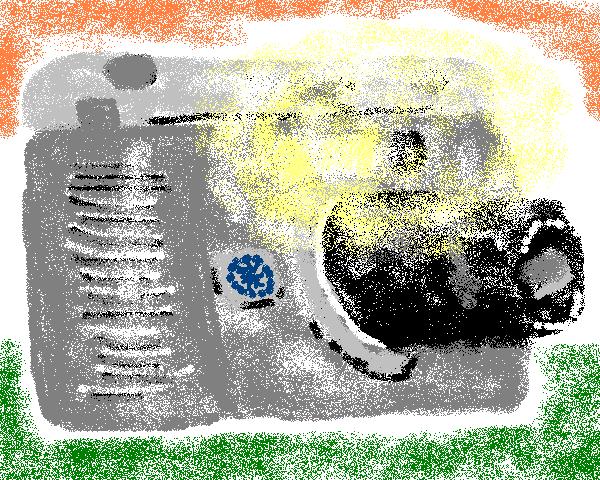
Probably one of the most well-deserved Oscars I've seen awarded in a long time. I was lucky enough to have gone to see it at the Kendall Sq. Cinema before the Oscar ceremony two weeks ago Sunday. In and of its own right, an excellent film, Born into Brothels runs the gamut of emotions, and challenges the viewer's notions of mores, innocence, and the power of education.
Chronicling filmmaker, Zana Briski's journey through the brothels of Calcutta to document the lives of sex workers, her subject immediately shifts to the lives of the children also living in the Calcutta red light district. Taken by their energy, curiosity, and engaging characters, Briski begins to teach a small group how to frame and compose photographs. She issues them small automatic cameras that the children then use to document their lives in the two crowded alleys comprising their forbidden world. This serves a dual purpose. The children, more adept in negotiating access to the inner-lives of the sex workers, clients, and other denizens of the Calcutta brothels, are better able to capture life inside the brothel than she was. Also, it propels her beyond her initial mission of documenting the lives of sex workers to taking active steps to help their children out of their desperate circumstances; ones that for several (the girls in particular) would result in their own entrapment into the skin trade.
The beauty of the film lies in Briski's humility. Unlike many fictional stories and documentaries of Westerner's visiting and observing the peoples of a developing land, she opens herself to the trials and frustrations that the children and their parents face in their dire circumstances. Her simple digital camcorder is unwavering as it records the joys and sorrows of her subjects, including herself. And moreso, in her humility, she shuns the center stage in deference to the children, allowing their pictures, their voices, and their actions to relay their individual and collective stories to the audience. And from them, she draws inspiration and an education on perseverance, and the capacity of the human spirit. Because for its many tragic moments, and overall tragic circumstances, the children remain children: laughing, playing, uncannily observant and creative, and despite all that besets them, full of life and dignity.
As educators, we witness a curriculum in action, rich with potential real-world outcomes. Not only do the children apply what they learn from Briski's coaching, but they also collaborate through interactive discussions, viewing and critiquing each others work. They talk directly and with striking maturity about the emotions their pictures convey and their rationale behind their pieces: selections of subject, setting, framing, lighting, angle, etc. They discuss the theory, apply it in the field, then revisit the theory to critique and learn further from their end products. Briski takes this a step further by inviting other photographers to teach a class and discuss the children's work with them, by setting up a gallery showing for local affluent art aficionados, and in an episode with all the theatrical suspense of a Hitchcock thriller, submits the work of one of her charges for entry to an international youth photography summit. One couldn't ask for more authentic performances of understanding and assessments!
The most transformative experiences for Briski and the children lay in her attempts to get the children into the local boarding schools. With the inherited stigma affixed to children of sex-workers, the schools were loathe to accept them. Even the hardest hearts in the audience tearfully succumb to the children and Briski's rollercoaster of triumphs and defeats as school after school finds reason to not admit the children. Even with potential admission, the children still face the obstacles of family that may wish for them to stay in the brothels, financial burden, as well as the fears and homesickness any 10 year-old would have in leaving their only home.
Born into Brothels serves as a persistent reminder of why I came to the School of Education in the first place. Briski, a photojournalist without formal training as an educator, armed only with a love for her art and the children with whom she shares it, provides the children with and herself gains transcendence over unimaginable odds. If in the heart in every educator there lay a Zana Briski, the world could truly be transformed. Until then, start by spending the 8 bucks and two hours to have yourself touched and transformed by these incredible children, Born into Brothels.




No comments:
Post a Comment